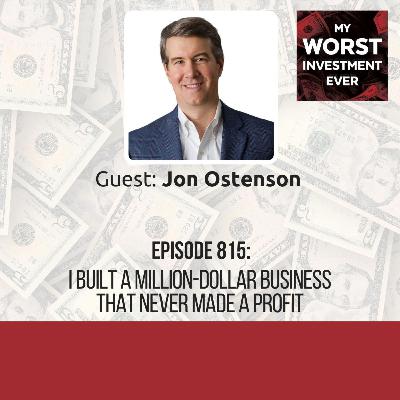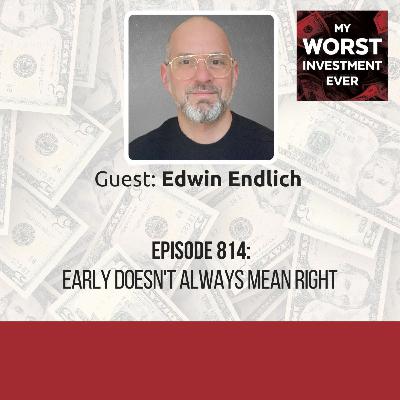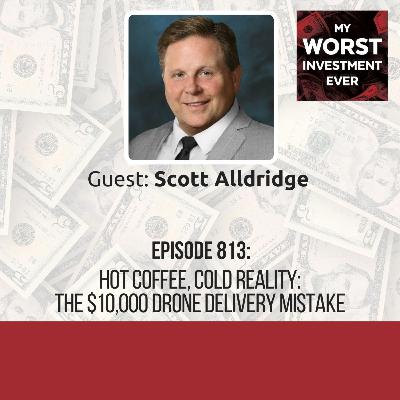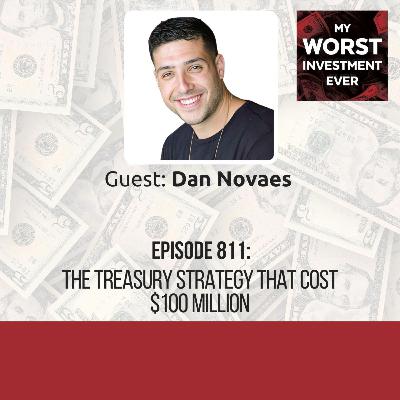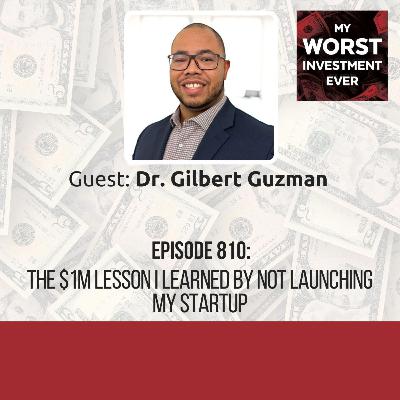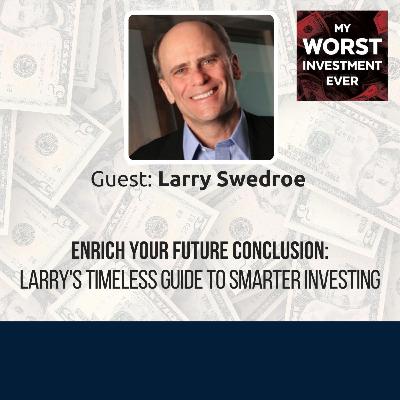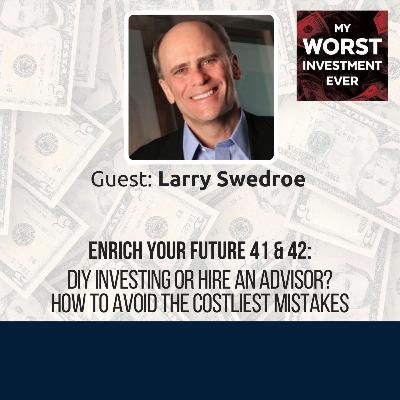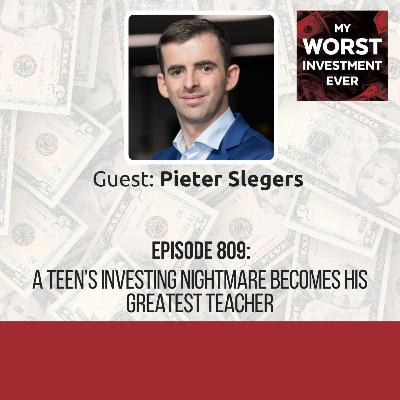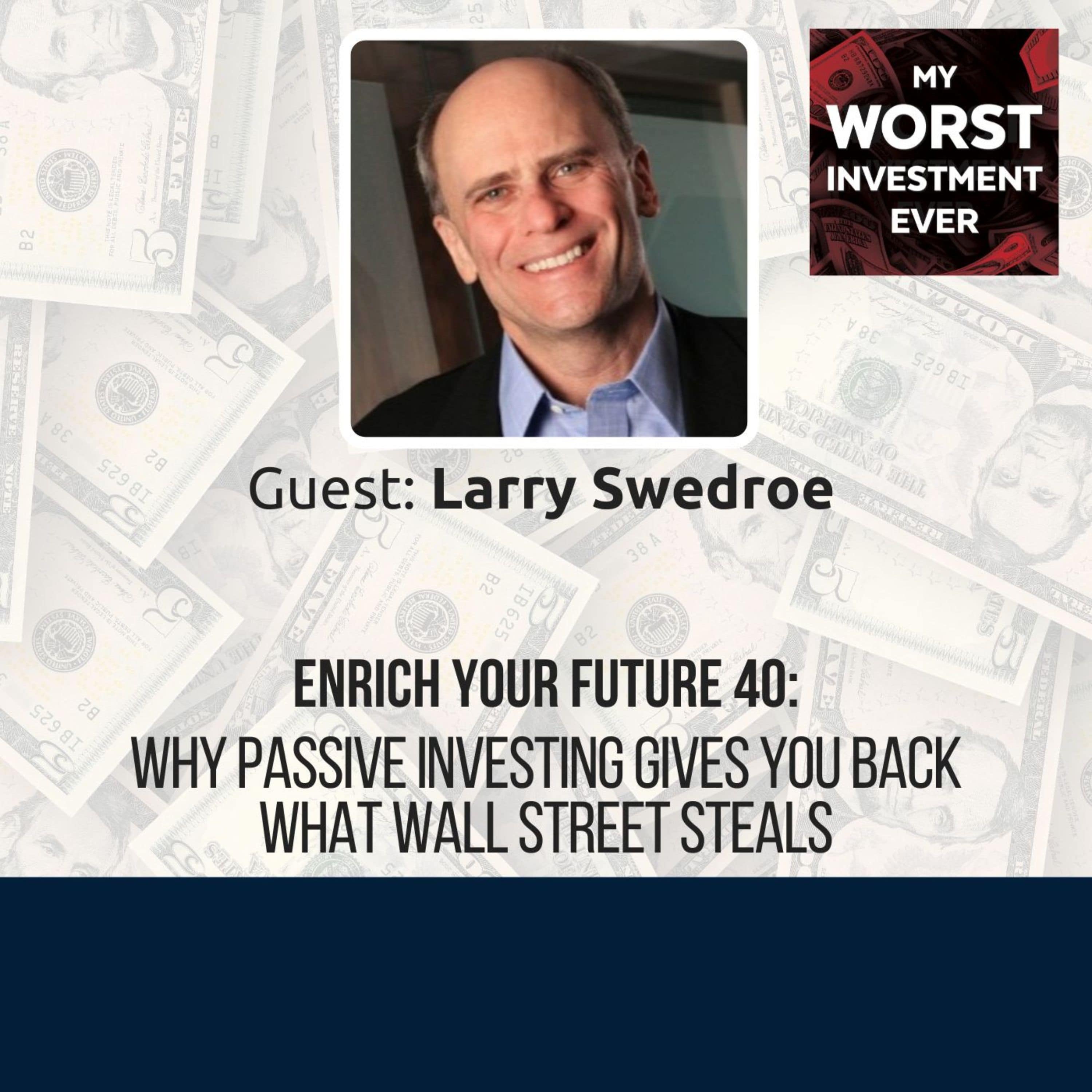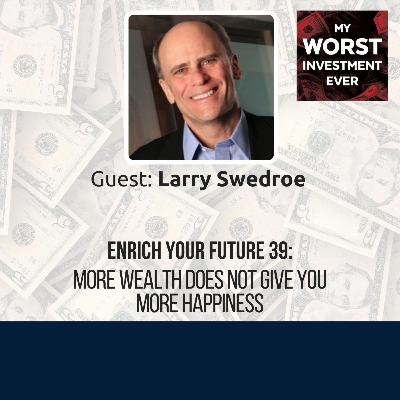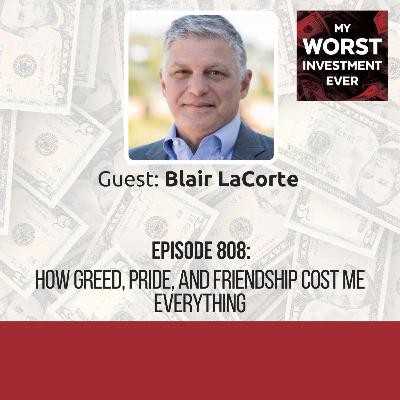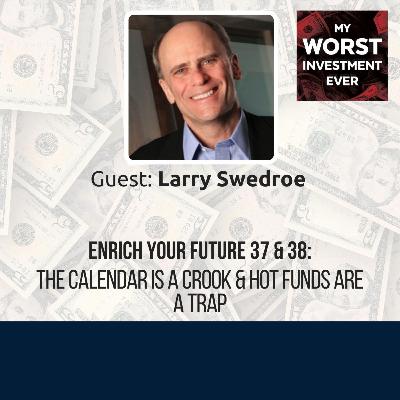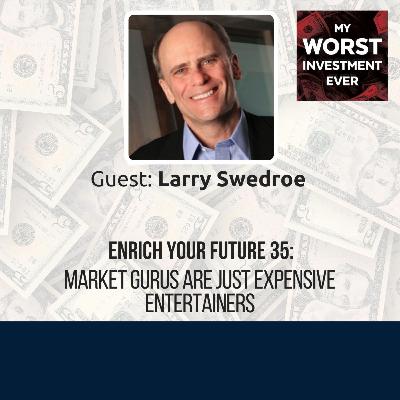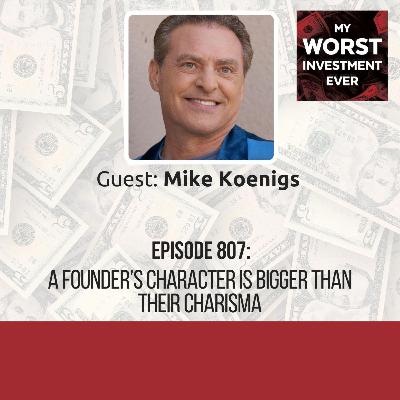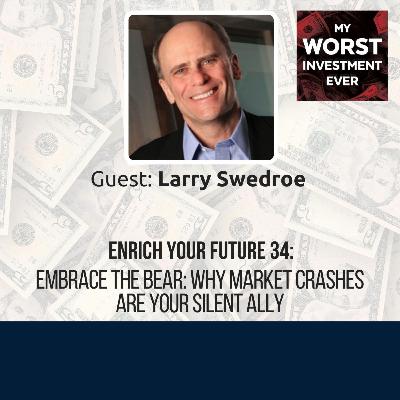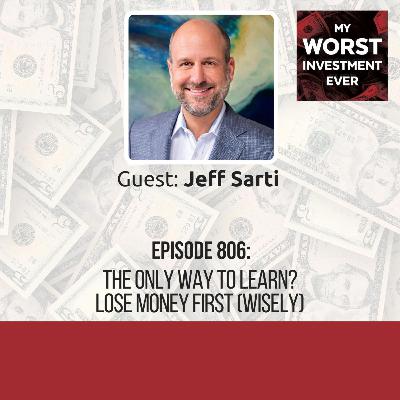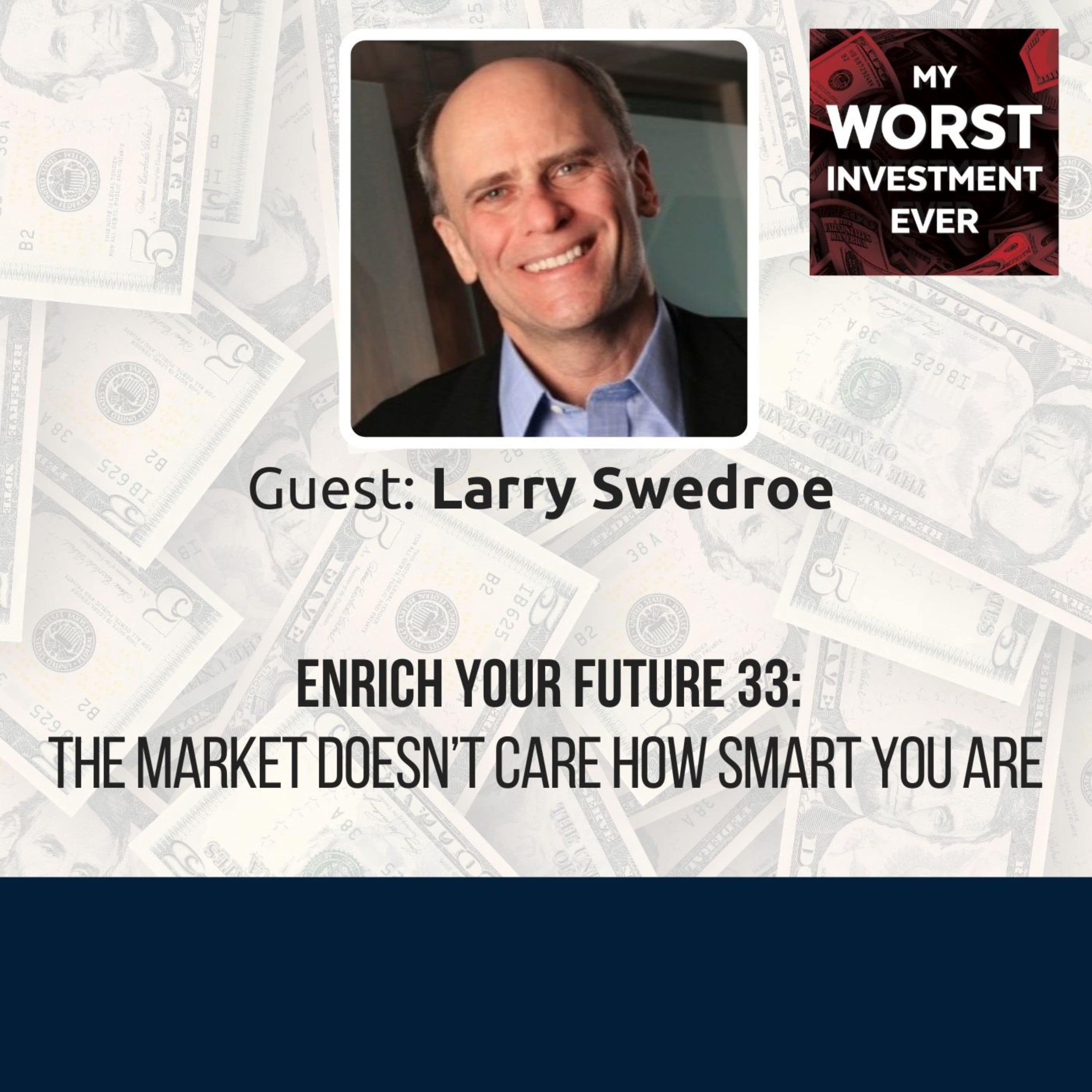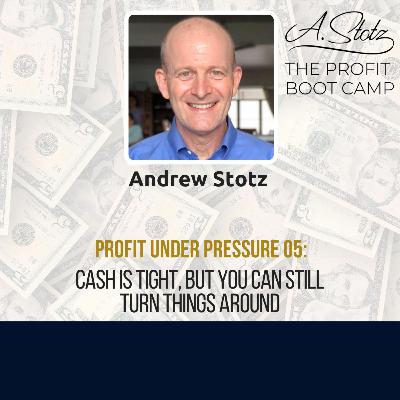Discover My Worst Investment Ever Podcast
My Worst Investment Ever Podcast

My Worst Investment Ever Podcast
Author: Andrew Stotz
Subscribed: 218Played: 11,357Subscribe
Share
© Copyright 2026 Andrew Stotz
Description
Welcome to My Worst Investment Ever podcast hosted by Your Worst Podcast Host, Andrew Stotz, where you will hear stories of loss to keep you winning. In our community, we know that to win in investing you must take the risk, but to win big, you’ve got to reduce it.
Your Worst Podcast Host, Andrew Stotz, Ph.D., CFA, is also the CEO of A. Stotz Investment Research and A. Stotz Academy, which helps people create, grow, measure, and protect their wealth.
To find more stories like this, previous episodes, and resources to help you reduce your risk, visit https://myworstinvestmentever.com/
Your Worst Podcast Host, Andrew Stotz, Ph.D., CFA, is also the CEO of A. Stotz Investment Research and A. Stotz Academy, which helps people create, grow, measure, and protect their wealth.
To find more stories like this, previous episodes, and resources to help you reduce your risk, visit https://myworstinvestmentever.com/
896 Episodes
Reverse
BIO: Jon is the Founder and CEO of FranBridge Consulting, a 2-time Inc. 5000 company, and he is a top 1% franchise consultant.STORY: Jon co-founded a marketing and call-center business that appeared successful on the surface, growing to millions in revenue and dozens of employees. However, excessive customization and an inability to charge prices that matched rising costs meant the business never became sustainably profitable.LEARNING: Profitability is oxygen. Knowing when to admit you’re wrong matters just as much as knowing how to start. “Humble yourself and admit when you’re wrong, course correct, and pivot.”Jon Ostenson Guest profileJon Ostenson is the Founder and CEO of FranBridge Consulting, a 2-time Inc. 5000 company, and he is a top 1% franchise consultant. Jon is also the author of the bestselling book, Non-Food Franchising. Jon draws on his experience as a former Inc. 500 Franchise President and Multi-Brand Franchisee in helping his clients select their franchise investments.Worst investment everLeaving the corporate world felt like freedom. After years of structure, predictability, and steady paychecks, you finally get to build something of your own. That was precisely where Jon found himself: grateful for his corporate experience, energized by the idea of business ownership, and eager to prove he could create something meaningful on his own terms.A promising partnership and a compelling business visionShortly after leaving corporate life, Jon partnered with a colleague to launch a marketing and sales company. He owned 60 percent of the business and ran day-to-day operations, while his partner held the remaining 40 percent.The vision was compelling. The company would help franchise businesses grow by handling their marketing, answering inbound calls through an in-house call center, and booking appointments directly for clients. The promise was simple: make the phones ring and convert those calls into revenue.Early momentum and the illusion of successAt first, it worked. The business grew quickly, attracting a strong leadership team and building a culture Jon was proud of. With around 35 employees and annual revenues of $3 million to $4 million, the company appeared successful from the outside. The team was energized, clients were signing on, and the pace was exciting.When growth didn’t translate into profitBut beneath the surface, there was a quiet, persistent problem.The business wasn’t profitable.Despite all the effort, the long hours, and the constant tweaking, the company hovered around breakeven. Some months it lost money. Others it barely scraped by. Payroll was always looming, and profitability felt just out of reach. Jon tried adjusting pricing, shifting emphasis between marketing and call center services, and introducing new technology to increase value.But every fix only delayed the inevitable question he didn’t want to answer: What if the model itself was broken?The hidden cost of customization and complexityThe core issue turned out to be customization. The business was designed to scale by serving franchise systems with repeatable processes. Instead, each franchisee insisted their market was different, their staff was unique, and their customers required special handling. Wanting to please early clients and drive revenue, Jon said yes. Again and again.Over time,...
BIO: Edwin Endlich is the Chief Marketing Officer of Wysh and President of the National Alliance for Financial Literacy and Inclusion.STORY: Edwin’s worst investment was buying Tilray stock at $143 during the early hype of legal cannabis investing. Swept up in the excitement of a “new frontier,” he held on as the price crashed—eventually selling at around 30 cents and losing over 99% of his investment.LEARNING: The fundamentals always apply, even in new or exciting industries. Don’t let hype replace due diligence. “We’re in this AI conversation, let’s not forget the fundamentals of the market. Learn from what has happened in this space before. And don’t get too cocky.”Edwin Endlich Guest profileEdwin Endlich is the Chief Marketing Officer of Wysh and President of the National Alliance for Financial Literacy and Inclusion. Edwin has spent his career at the intersection of marketing, fintech, and AI, helping financial institutions tell more human stories in an increasingly digital world. He’s passionate about making financial protection simple, accessible, and even a little more fun — proving you don’t need buzzwords or hype to make banking and technology relevant.Worst investment everThere’s nothing quite like the rush of feeling early—early to a trend, early to a movement, early to a once-in-a-lifetime opportunity. That’s precisely what Edwin felt in 2015–2016, when investing in legal cannabis became possible in parts of the United States.For the first time, regular people could invest in a newly legalized industry. It felt like history happening in real time, a frontier market ready to explode. Edwin and his friends didn’t want to miss out, especially when companies were going public, and their share prices seemed destined to skyrocket.One of those stocks was Tilray. At $143 a share, Edwin was convinced he was buying the future. He imagined stock splits, booming demand, and a cannabis empire rising from the ground floor. Instead, he watched that $143 tumble month after month, until he finally sold it for around 30 cents. The emotional rollercoaster of hope, disappointment, and finally acceptance was a journey Edwin will never forget.A 99.3% loss.He now calls it his worst investment—not just because of the financial hit, but because of how powerfully excitement and hype clouded his judgment.Lessons learnedEvery investor thinks their situation is unique. But in reality, the same patterns repeat again and again.Markets take time to mature.Regulation can shift overnight.Early doesn’t always mean right.Excitement is not a strategy.Andrew’s takeawaysA portfolio isn’t just about diversification by industry or geography; it’s also about diversifying across stages of maturity.Stable, well-regulated companies like Coca-Cola or Pepsi behave very differently from early-stage, hype-driven industries, such as the cannabis sector.Even large companies, with teams of top analysts, often get it wrong.Actionable adviceIf Edwin could offer one piece of advice to anyone starry-eyed over the next big thing, it would be this:Do your due diligence. Seriously.Before you invest in anything—especially something exciting, futuristic, or rapidly trending—slow down and ask:Has this been done before?What can I learn from past bubbles?What does...
BIO: Scott Alldridge is CEO of IP Services and President of the IT Process Institute, a bestselling author of the VisibleOps series, and a Certified Chief Information Security Officer.STORY: Scott’s worst investment was a stake in a startup promising to deliver hot coffee by drone. Excited by the futuristic idea, he invested before the concept was proven—but the project quickly crashed when the FAA banned drone deliveries and a prototype failed spectacularly.LEARNING: Being first doesn’t always mean being right. Due diligence is non-negotiable. “You don’t have to jump in. Being the first with the most doesn’t matter if it’s a bad idea—you’ll lose money anyway.”Scott Alldridge Guest profileScott Alldridge is CEO of IP Services and President of the IT Process Institute, a bestselling author of the VisibleOps series, and a Certified Chief Information Security Officer. He holds an MBA in cybersecurity and has over 30 years of experience in IT and cybersecurity leadership. Scott empowers organizations to achieve resilience through process excellence, Zero Trust, and AI-driven security.Worst investment everIf you live in the Pacific Northwest, coffee isn’t just a drink; it’s a way of life. Seattle is home to Starbucks, and in Oregon, coffee culture runs deep. So when Scott was pitched an idea that combined coffee and technology—delivering hot coffee via drone—he couldn’t resist.The concept sounded revolutionary: push a button on your phone, and a drone drops off your piping-hot Americano right at your doorstep. It felt like the future—part Amazon innovation, part TED Talk dream.Excited, Scott invested for a 3% stake in the startup. The founders promised a caffeinated empire built on convenience and cutting-edge tech.But just three months later, the buzz wore off. The FAA issued a cease-and-desist order on all drone delivery experiments, particularly those involving liquids.And then came the final straw: the company’s prototype drone spilled an entire cup of hot coffee mid-flight, grounding both the drone and Scott’s hopes. The “coffee drone revolution” turned into a $10,000 lesson in wishful thinking. Delivering hot coffee by drone was never going to fly—literally.Lessons learnedBeing first doesn’t always mean being right.It’s tempting to jump into the next big idea, especially when it sounds exciting and visionary. However, early-stage innovation carries significant risk, especially when the concept hasn’t been tested or proven.Enthusiasm can cloud judgment. Instead of investing based on a slick pitch deck or futuristic concept, it’s smarter to wait until an idea is validated, tested, and compliant with regulations.Andrew’s takeawaysEvery idea looks brilliant until reality—and regulation—show up.Even in large corporations, where top analysts and executives lead multi-million-dollar mergers, success isn’t guaranteed. Only about 20% of them added value within three to five years.Business is hard, and due diligence is non-negotiable.Actionable adviceAlways do your due diligence. Before investing in any idea—no matter how exciting—slow down and dig deep:Validate the concept. Is there a working prototype, or just a fancy pitch?Check the regulations, especially if the business operates...
BIO: Thomas J. Powell, founder of The Powell Perspective™, is a seasoned entrepreneur, investor, and advocate for founders, bringing clarity, strategy, and resilience to leaders building at scale.STORY: Thomas invested $3.6M in a friend’s cannabis company, where he ignored his own due diligence framework. Because he skipped key governance protections and didn’t document alignment or exit terms, the investment became frustrating, hard to control, and nearly impossible to fix—proving that breaking your own rules is the most expensive mistake.LEARNING: Never mix friendship and business. Make sure both you and the founder are solving the same problem. “They say good fences make good neighbors, good documents keep good friendships.”Thomas Powell Guest profileImagine navigating the high-stakes world of capital, strategy, and legacy with a guide who has raised billions and structured ventures worldwide. Thomas J. Powell, founder of The Powell Perspective™, is a seasoned entrepreneur, investor, and advocate for founders, bringing clarity, strategy, and resilience to leaders building at scale.Worst investment everYou’ve probably heard the saying, “Never mix friendship and business.” Thomas learned that lesson the hard way.His story starts with good intentions. When his kids’ grandmother battled breast cancer, cannabis was the only thing that eased her treatment side effects. So when medical marijuana became legal in a few US states, investing in the cannabis industry felt like the right thing to do.But here’s where things went wrong.A close friend brought him the deal, and because of that personal connection, Thomas skipped many of the due diligence steps he usually followed through his family office. No detailed governance clauses. No proper reporting framework. No accountability structure.It wasn’t a small investment either—about $3.6 million. As time went on, the cracks began to show. The company missed financial reports, accounting systems were weak, and when COVID hit, things only got messier. To make matters worse, taking over the business wasn’t even an option since he didn’t have a cannabis license. The emotional toll of this situation was significant, as Thomas had to face the reality of his investment failing due to trusting a friend blindly.The worst part? Having to look a friend in the eye, knowing he’d broken his own investment rules.Lessons learnedVerify alignment: Make sure both you and the founder are solving the same problem, and that you share the same exit goals. Ask questions like, “If someone offered to buy this company for $25 million today, would you sell?” If your answers don’t match, you’re not aligned.Watch the hubris: Just because you’re smart or successful doesn’t mean you can see around every corner. Understand the legal and regulatory landscape before investing, especially in industries like cannabis, where compliance is complex.Enforce accountability: Set clear reporting expectations from day one and include consequences for missed deadlines. Thomas admits that if his deal had stricter enforcement clauses, it would’ve saved him time, money, and frustration later on.Andrew’s takeawaysMany startups underpay themselves. It might sound noble, but it actually distorts valuation and creates problems later.Make sure founders are paying themselves a market-rate salary. That way, when the business is valued or...
BIO: As Co-Founder & CEO of Mode Mobile, Dan Novaes is leading the transformation of how people interact with technology. His “Earn As You Go” software empowers millions of consumers to turn daily habits into passive income.STORY: Dan decided to take the bold move of turning his treasury into a long-term crypto strategy. What started as $2 million in Bitcoin and Ethereum ballooned to $30 million, but the 2022 crash and business pressures forced him to liquidate at low prices—missing out on what could have been a $100 million windfall.LEARNING: Don’t chase aggressive expansion without a clear path to profitability. Stick to your core business. Separate your business from speculative bets. “Everyone has a plan until they get punched in the face. Take a moment of deep thinking every week when things are going well, think about everything that could go wrong, and then reassess your position.”Dan Novaes Guest profileAs Co-Founder & CEO of Mode Mobile, Dan Novaes is leading the transformation of how people interact with technology. His “Earn As You Go” software empowers millions of consumers to turn daily habits into passive income. Under his leadership, Mode achieved 32,481% revenue growth from 2019 to 2022 and ranked #1 in Software on Deloitte’s Technology Fast 500 in North America.Worst investment everIn today’s rapidly evolving and highly interconnected business world, companies are increasingly relying on external partnerships to drive growth and innovation.Dan’s story begins in the early days of crypto. His company had raised funds through Bitcoin and Ethereum when Bitcoin was valued at just a few thousand dollars and Ethereum at only a few hundred. This early success in the crypto market was a testament to the potential for significant growth that these investments could bring.Once the business had a comfortable runway, Dan made a bold move—he turned their treasury, which is the accumulated profits and cash reserves, into a long-term crypto strategy, much like what companies like MicroStrategy would later become known for.Riding the waveAt first, the decision looked genius. That $1–2 million ballooned into $30 million. Dan was on CNBC, celebrating as Bitcoin crossed $10,000, and his company seemed unstoppable. They never had to fundraise again—until the 2022 crash.The crashIn 2022, Bitcoin’s price fell from $63,000 to $18,000, and pressure mounted. Compounding the pain, many of Dan’s advertising partners went bankrupt, leaving unpaid bills. This was a significant blow to the company’s financial stability. To survive, Dan’s company had to liquidate almost the entire treasury at depressed prices.Had Dan managed his growth and financials more cautiously, that crypto position could have grown to $100 million or more. Instead, he walked away with far less—and a bitter lesson.Lessons learnedGrowth at all costs is dangerous. Chasing aggressive expansion without a clear path to profitability can leave your company vulnerable when market conditions shift.Profit-taking matters. Riding the wave without ever securing gains turned paper wealth into a forced liquidation.Stick to your core business.Discipline is everything. Not letting market euphoria dictate strategy is critical to long-term survival.Andrew’s takeawaysSeparate your business from speculative bets. Don’t gamble with your excess cash on foreign exchange trades. Instead, hedge your risks because...
BIO: Dr. Gilbert A. Guzmán is a business strategist and systems thinker. He is the founder of IntraQ AI, a SaaS solution designed to eliminate knowledge gaps within the workplace, and the author of Atomic Impact: Systems for Transformative Productivity.STORY: In 2012, Gilbert envisioned a portable charger vending system for airports, universities, and theaters—a “Redbox for power.” He over-engineered, over-researched, and waited for “perfect”—while another company launched the same concept. By the time he moved, they dominated airports with a first-mover advantage.LEARNING: Jump in and get things going. Don’t be afraid to fail. Iterate, and get your product to market. “Don’t be afraid to iterate. Maintain the course, and you’ll see your product through.”Dr. Gilbert A. Guzmán Guest profileDr. Gilbert A. Guzmán is a business strategist and systems thinker. He is the founder of IntraQ AI, a SaaS solution designed to eliminate knowledge gaps within the workplace, and the author of Atomic Impact: Systems for Transformative Productivity, which you can get for free using the code: Stotz.With a doctorate in business and experience leading large teams, he helps organizations boost productivity through practical systems built for real-world constraints. His work bridges people, data, and technology for lasting operational success.Worst investment everIn 2012, Gilbert envisioned a portable charger vending system for airports, universities, and theaters—a “Redbox for power.” Users would rent charged batteries and return them to kiosks for reuse.Ironically, Gilbert is a very impatient man, but when it comes to business ideas, he takes his sweet time, sometimes too long. This is exactly what happened with the portable charger idea.Gilbert over-engineered, over-researched, and waited for “perfect”—while Fuel Rod launched the same concept. By the time he moved, they dominated airports with a first-mover advantage. He invented the wheel but didn’t roll it.Lessons learnedJump in, do what you need to do, stay up late, work hard, do the research, and get things going. Ultimately, everything will come to fruition.Manage your risks.You can earn back cash, but you can’t earn back lost time.In startups, a bad launch always beats no launch. Waiting for no flaws means 100% flaw: no product.You can’t be a risk-averse leader.Andrew’s takeawaysMVPs beat masterpieces because if you’re not embarrassed by the first version of your product, you launched too late.The market doesn’t care who invented a product—it cares who shipped it.Actionable adviceDon’t be afraid to fail. Iterate, get your product to market, and find out if it makes sense and is relevant.Don’t get scared of the big names, the Googles of the world, and think that they will crush you.You don’t have to be horizontal. You can go vertical. You can find a niche and dedicate your time to it.Gilbert’s recommendationsGilbert recommends his e-book Atomic Impact: Systems for Transformative Productivity (remember to use code Stotz for a free copy).He also recommends visiting his
In this episode of Enrich Your Future, Andrew and Larry Swedroe discuss Larry’s new book, Enrich Your Future: The Keys to Successful Investing. In this series, they conclude the lessons from the book.LEARNING: Investing isn’t about chasing the next hot stock—it’s about building a resilient, well-diversified portfolio you can live with in good times and bad. “Once you have enough, stop playing the game as if you don’t. Reduce risk, enjoy life, and make your money serve you—not the other way around.”Larry Swedroe In this episode of Enrich Your Future, Andrew and Larry Swedroe discuss Larry’s new book, Enrich Your Future: The Keys to Successful Investing. The book is a collection of stories that Larry has developed over 30 years as the head of financial and economic research at Buckingham Wealth Partners to help investors. You can learn more about Larry’s Worst Investment Ever story on Ep645: Beware of Idiosyncratic Risks.Larry deeply understands the world of academic research and investing, especially risk. In this series, they conclude on the lessons from the book.Enrich Your Future: Larry’s Timeless Guide to Smarter InvestingIf you’ve ever wondered how to cut through the noise of investment hype and build a portfolio that actually works for you, Larry’s Enrich Your Future is the blueprint you’ve been looking for. Here’s a distilled look at the wisdom from his book.Start with core principlesLarry insists there are only a handful of fundamental truths in investing—and if you master them, you’ll avoid most costly mistakes:Markets are highly efficient – While not perfect, markets price assets so effectively that consistently beating them on a risk-adjusted basis is near impossible. So don’t engage in individual security selection or market timing.All risk assets offer similar risk-adjusted returns – Whether it’s US stocks, Thai stocks, or corporate bonds, the relationship between risk and return holds steady over time. Invest in assets based upon your ability, willingness, and need to take risks. If you’re willing to take more risk and have the ability and maybe the need to, then you can load up on more risky, higher expected-returning assets. It doesn’t mean they’re better assets; rather, they have higher expected returns at the cost of higher risk.Diversification is non-negotiable – Since all risk assets have similar risk-adjusted returns, it makes no sense to concentrate all of your risk in one basket. Concentrating your risk in a single asset class or geography is a recipe for trouble.Build a portfolio that fits YOUForget cookie-cutter solutions—Larry believes the “right” portfolio depends on three factors:Ability to take risk – Your financial capacity to weather market downturns is influenced by factors like investment horizon and job stability.Willingness to take risk – Your psychological comfort level with market volatility.Need to take risk – Whether you require high returns to meet your financial goals.Larry’s rule? Let the lowest of these three determine your equity exposure. If you don’t need to take big risks, don’t.Think global, but stay rationalA...
In this episode of Enrich Your Future, Andrew and Larry Swedroe discuss Larry’s new book, Enrich Your Future: The Keys to Successful Investing. In this series, they discuss Chapter 41: A Tale of Two Strategies and Chapter 42: How to Identify an Advisor You Can Trust.LEARNING: Passive investing is still the winner. If something is worth doing, it’s worth paying someone to do it for you. “A good wealth advisor helps you build a plan and choose the best investment vehicles that’ll give you the best chance of achieving your life and financial goals.”Larry Swedroe In this episode of Enrich Your Future, Andrew and Larry Swedroe discuss Larry’s new book, Enrich Your Future: The Keys to Successful Investing. The book is a collection of stories that Larry has developed over 30 years as the head of financial and economic research at Buckingham Wealth Partners to help investors. You can learn more about Larry’s Worst Investment Ever story on Ep645: Beware of Idiosyncratic Risks.Larry deeply understands the world of academic research and investing, especially risk. Today, Andrew and Larry discuss Chapter 41: A Tale of Two Strategies and Chapter 42: How to Identify an Advisor You Can Trust.Chapter 41: A Tale of Two StrategiesIn Chapter 41, Larry explains why investors who have implemented the types of passive strategies recommended in his book have experienced “the best of times.” On the other hand, for those who continue to play the game of active investing, it has generally been the “worst of times.”“It was the best of times, it was the worst of times.” Charles Dickens may have been writing about the French Revolution, but Larry observes that that line rings true for today’s investors, too. Depending on how you approach the market, your experience can feel like either a triumph or a disaster.If you’re betting on active management, it’s the worst of timesAccording to Larry, people who still believe in the promise of active fund managers as the winning strategy are likely to find themselves in the “season of Darkness.” Over the years, the ability of active managers to consistently outperform has dwindled significantly.You may be surprised to learn that in 1998, when Charles Ellis wrote his famous book “Winning the Loser’s Game”, about 20% of actively managed funds produced statistically significant returns after adjusting for risk. That figure was already discouraging.A later study in 2014 (Conviction in Equity Investing) found that the percentage of managers producing any net alpha had dropped from 20% in 1993 to just 1.6%.Larry reminds investors who are holding on to the hope that active management will deliver the goods that they are swimming against a strong current. The odds aren’t in their favour—and neither are the expenses.It’s the best of times for passive investorsIf you’ve embraced passive investing, it’s the best of times. The resounding success of this strategy, backed by a wealth of data and real-world results, should instill a strong sense of confidence in your investment decisions.For investors who believe that markets are efficient...
BIO: Pieter Slegers is the founder of Compounding Quality Newsletter. Pieter worked for three years as a Belgian asset manager before focusing full-time on his investment newsletter, Compounding Quality, in July 2022. Compounding Quality has over 1 million followers across social media and nearly 500,000 email subscribers. The goal of the newsletter is to help other investors by focusing on Quality Investing.STORY: At the age of 13, Peter convinced his parents to open a brokerage account. He picked the broker’s newest “hottest pick” stock—an oil/gas transport company. He invested everything, thinking the people running the company knew what they were doing. Weeks later, the 2008 financial crisis hit. Peter sold his stock after a year, taking a 60% loss.LEARNING: Small losses are better than catastrophic ones. Knowledge is your only edge. “People who invest in individual stocks will make mistakes. There’s no doubt about that, but it’s way better to make a mistake with a few hundred dollars compared to $100,000.”Pieter Slegers Guest profilePieter Slegers is the founder of Compounding Quality Newsletter. Pieter studied Financial Management at the KULeuven and graduated summa cum laude. He worked for three years as a Belgian asset manager before focusing full-time on his investment newsletter, Compounding Quality, in July 2022. Compounding Quality has over 1 million followers across social media and nearly 500,000 email subscribers. The goal of the newsletter is to help other investors by focusing on Quality Investing.Worst investment everAt the age of 13, Peter earned his first paycheck by stocking shelves at a supermarket. Eager to grow his savings, he persuaded his parents to open a brokerage account (a feat for minors in Belgium).Despite his lack of investing knowledge, he diligently explored his broker’s platform for ideas. A new stock caught his eye on the broker’s “hot picks” list—an oil/gas transport company. He invested all his earnings, believing in the company’s potential.Peter didn’t conduct any research, despite his limited knowledge of oil and gas and his complete lack of investing experience. He simply trusted the “hot pick”.The crashWeeks later, the 2008 financial crisis hit. Peter sold his stock after a year, taking a 60% loss. His family was not impressed by his poor investment skills and told him that investing was akin to gambling, and he should consider working for the government instead.Pieter felt like such a failure. However, that $300 loss was his best investment. It hurt, but it taught him never to follow others blindly.Lessons learnedSmall losses are better than catastrophic ones. Losing $300 at the age of 13 beats losing $300,000 when you’re 40. Early pain builds immunity to big mistakes.Knowledge is your only edge: If you don’t understand how a company makes money, you’re gambling, not investing.Failure fuels obsession. That loss made Pieter devour investing books, 10-Ks, and financial news. Pain became his mentor.Andrew’s takeawaysAllow young investors to make mistakes with small sums (e.g., companies they understand, such as Netflix or Coca-Cola).Humility beats hubris. 90% of professional investors at Goldman Sachs underperform. What makes you different? It’s your checklists, not confidence.Read biographies, study market history, and connect patterns. Wisdom compounds like interest.Actionable...
In this episode of Enrich Your Future, Andrew and Larry Swedroe discuss Larry’s new book, Enrich Your Future: The Keys to Successful Investing. In this series, they discuss Chapter 40: The Big Rocks.LEARNING: Passive investing will give you the freedom you need. “Indexing and passive investing have the ‘disadvantage’ of being boring. I admit it. However, if anyone needs to get their excitement in life from investing, I’d suggest they might want to consider getting another life.”Larry Swedroe In this episode of Enrich Your Future, Andrew and Larry Swedroe discuss Larry’s new book, Enrich Your Future: The Keys to Successful Investing. The book is a collection of stories that Larry has developed over 30 years as the head of financial and economic research at Buckingham Wealth Partners to help investors. You can learn more about Larry’s Worst Investment Ever story on Ep645: Beware of Idiosyncratic Risks.Larry deeply understands the world of academic research and investing, especially risk. Today, Andrew and Larry discuss Chapter 40: The Big Rocks.Chapter 40: The Big RocksIn Chapter 40, Larry explains why passive (systematic) investing is the winning strategy in life as well as investing.Like all the other chapters in the book, this one begins with a story used as an analogy to help understand a financial issue. In this one, a time-management expert fills a mason jar with large rocks. “Full?” she asks. The class agrees. She adds gravel, sand, and water – each filling the spaces between. When a student suggests the lesson is about fitting more into busy schedules, she corrects them:“If you don’t put the big rocks in first, they’ll never fit at all.”The investor’s jarLarry explains the metaphor’s profound implication for wealth:Big rocks = Family, health, growth, legacyGravel = Stock charts, earnings analysisSand = Financial news, market commentaryWater = Trading forums, portfolio tinkeringLarry explains that active investors start with gravel and sand, leaving insufficient time for the big rocks. They spend much of their precious leisure time watching the latest business news, studying the latest charts, scanning and posting on Internet investment discussion boards, reading financial trade publications and newsletters, and so on. Their jars fill with noise, leaving no room for life’s essentials.Passive investors, on the other hand, ignore the ”noise” (the sand, the gravel, and the water) and place big rocks first. Their strategy operates quietly, driven by low-cost index funds and disciplined rebalancing. The result? Their jars hold what truly enriches life, giving them a sense of freedom and independence.Two stories, one lesson1. The physician’s regretDuring the 1990s bull market, a doctor would spend nights analyzing stocks after 12-hour shifts. He turned $10,000 into $100,000 – but his marriage was on the verge of collapse. His wife no longer had a husband; his child lost a parent to the glow of stock charts. When the tech bubble burst, the money vanished.The wake-up call was brutal: He had traded first steps and bedtime stories for digits on a screen. After reading Larry’s book, he switched to passive investing, which...
In this episode of Enrich Your Future, Andrew and Larry Swedroe discuss Larry’s new book, Enrich Your Future: The Keys to Successful Investing. In this series, they discuss Chapter 39: Enough.LEARNING: More wealth does not give you more happiness. “Prudent investors don’t take more risk than they have the ability, willingness, or need to take. If you’ve already won the game, why are you still playing?”Larry Swedroe In this episode of Enrich Your Future, Andrew and Larry Swedroe discuss Larry’s new book, Enrich Your Future: The Keys to Successful Investing. The book is a collection of stories that Larry has developed over 30 years as the head of financial and economic research at Buckingham Wealth Partners to help investors. You can learn more about Larry’s Worst Investment Ever story on Ep645: Beware of Idiosyncratic Risks.Larry deeply understands the world of academic research and investing, especially risk. Today, Andrew and Larry discuss Chapter 39: Enough.Chapter 39: EnoughIn Chapter 39, Larry discusses the importance of knowing that you have “enough,” a concept that, once understood, can enlighten and guide your financial decisions.In 2009, Larry conducted an investment seminar for the Tiger 21 Group, America’s most exclusive wealth management group. One of the issues the group asked him to address was: How do the wealthy think about risk, and how should they approach it? Larry’s answer exposed a terrifying paradox.More wealth will not make you happierAccording to Larry, self-made wealth follows a predictable script. Fortunes are built through extreme risk-taking: betting everything on one business, ignoring diversification, and trusting instinct over analysis. This breeds a dangerous confidence—the kind that whispers, “If I did it once, I can do it again.”He explains that the utility of the wealth curve resembles an elephant from the side. It goes up quickly because when you have nothing, even a little extra money can significantly improve your life. If you’re homeless and someone gives you $25 to take a shower, get a meal, and stuff, that will make you much better off. But once you get to some level of net worth, like $2 million or $3 million, or whatever the number is for you, the extra wealth is better than less.However, as you gain more wealth, your incremental level of happiness—just like the elephant’s back— flattens out. There’s virtually little or no improvement in your state of well-being and happiness.The entrepreneur’s invisible trapLarry stresses that wealth building and wealth preservation demand opposite mindsets. Those with the greatest ability to take risks (resources to absorb losses) and willingness (confidence from past wins) often overlook the third critical factor: need. And therein lies the trap.The wealthiest individuals have a near-zero need for further risk. Yet, they continually strive for more and take on significant risks that may not ultimately lead to an enhanced level of happiness. In reality, they do not need to take such a substantial risk. They can dial down the risk in their portfolio and be much happier, sleep better, not worry about markets, and enjoy their life.When $13 million evaporatesLarry recounts meeting a couple in 2003. Three years earlier, their portfolio stood at $13 million, with...
BIO: Blair LaCorte is a dynamic executive with experience across entertainment, aviation, AI, aerospace, consulting, and more.STORY: Blair shares three catastrophic investment failures and the life-altering lessons that rewired his approach to wealth.LEARNING: Chase knowledge, not hype, and don’t let greed hijack logic. Invest with friends only if you’re willing to lose both. “The worst investment that you can make is to put your time into something that you don’t enjoy or that you know is not going to work out.”Blair LaCorte Guest profileBlair LaCorte is a dynamic executive with experience across entertainment, aviation, AI, aerospace, consulting, and more. He has held CEO roles at companies such as PRG, XOJET, and Autodesk, and led startups to successful IPOs. Currently, he’s training as an astronaut for Virgin Galactic and is Vice Chairman at the Buck Institute.Worst investment everFresh out of college at 22, Blair met a smooth-talking investor who flaunted his “lifetime monthly checks” from an oil well. Blinded by dollar signs and zero industry knowledge, he poured his savings into a single well.Blair ignored basic due diligence, diversification, and warnings about low-quality reserves. It was all about greed. He had seen someone make money where they got paid every month for the rest of their life, as long as the well lasted.The greed kept him in and kept him investing in the well. At the end of the day, the oil was of below-average quality and was not as much as they thought it would be. Blair’s ignorance caused him a 100% loss. The well underperformed, and his greed trapped him in a sinking ship. Blair even commissioned a plaque to memorialize his shame—a daily reminder that “easy money” is a predator in disguise.Burning $200k and a friendshipAfter Blair’s first IPO success in 1999, his roommate pitched him on Coffee.com—a visionary play on single-origin beans (decades before it became trendy). Blair invested early, then panicked as losses mounted. When the roommate begged for more capital, he refused because he did not think it would succeed, but guilt kept him from cutting ties.After a while, the startup imploded. Worse? Blair’s friend never spoke to him again. He learned the hard truth from this unwise investment: mixing money with friendship is financial suicide.The $59.50 ego taxAt the peak of the dot-com boom, Blair had just scored a top-tier IPO. His broker urgently called and advised him to sell immediately at $59.50 as he believed the boom would not last. But pride convinced him that the broker was just chasing commissions.Blair held stubbornly as the stock bled out to $2. He lost $570,000 in vaporized gains. Blair’s ego had bet against reality, and reality won.Lessons learnedChase knowledge, not hype, and don’t let greed hijack logic. If you don’t understand how the money is made, you’re the exit strategy for someone else.Friends + money = atomic risk. Invest with friends only if you’re willing to lose both on the same day.Pride is the silent portfolio killer. The market doesn’t care about your ego, and exit signals don’t negotiate.Your time is your ultimate currency. Grinding your years into a dying venture to ‘prove a point’ is the costliest investment of all.Andrew’s takeawaysMacro trumps micro. Brilliant ideas fail if they’re too early or too late. Always ask: “Is the world ready for this?”Preserve capital like your life depends on it. A young you can risk time; an older you must protect...
In this episode of Enrich Your Future, Andrew and Larry Swedroe discuss Larry’s new book, Enrich Your Future: The Keys to Successful Investing. In this series, they discuss Chapter 37: Sell in May and Go Away: Financial Astrology and Chapter 38: Chasing Spectacular Fund Performance.LEARNING: Calendars don’t drive returns. Winners ignore hot funds. “For you to believe in a strategy, there should be some economically logical reason for it to persist, so you can be confident it isn’t just some random outcome.”Larry Swedroe In this episode of Enrich Your Future, Andrew and Larry Swedroe discuss Larry’s new book, Enrich Your Future: The Keys to Successful Investing. The book is a collection of stories that Larry has developed over 30 years as the head of financial and economic research at Buckingham Wealth Partners to help investors. You can learn more about Larry’s Worst Investment Ever story on Ep645: Beware of Idiosyncratic Risks.Larry deeply understands the world of academic research and investing, especially risk. Today, Andrew and Larry discuss Chapter 37: Sell in May and Go Away: Financial Astrology and Chapter 38: Chasing Spectacular Fund Performance.Chapter 37: Sell in May and Go Away: Financial AstrologyIn chapter 37, Larry explains why the idea of selling stocks in May and switching to cash, then buying back in November, is not a sound strategy.What financial advisers insist on repeating, in Larry’s view, is: “Sell in May, go to cash, and reinvest in November.” It makes sense and is even logical. And, as the adage has it, numbers don’t lie. Figures, backed by reliable data, show that stocks gain more from November through April (a 5.7% average premium) than from May through October (a 2.6% average premium). So why not time the market?Busting the mythLarry dismantles this advice, revealing that the ‘Sell in May’ strategy, despite its apparent logic, is a myth. He points out that stocks still outperform cash even during the May to October period, with stocks beating T-bills by 2.6% annually.Selling stocks prematurely leads to missed gains, and the strategy of switching investments underperforms a simple buy-and-hold approach. In fact, a ‘Sell in May’ strategy yielded an average annual return of 8.3% from 1926 to 2023, while simply holding the S&P 500 returned 10.2%—a significant 1.9% yearly gap.Larry adds that Taxes and fees make the strategy worse. Trading converts long-term gains (lower tax) into short-term gains (higher tax). Transaction costs always pile up.Additionally, this strategy is rarely effective. Before 2022, the last “win” was 2011. A single outlier (2022’s bear market) does not make a strategy worthwhile.The fatal flawAccording to Larry, one of the fundamental rules of finance is that expected return and risk are positively correlated. So if stocks actually do worse than cash between May and October, they’d need to be less risky for these six months, which is absurd because volatility doesn’t take summer vacations.Why do people believe in this flawed strategy?Larry notes four reasons why people still believe in this flawed investment strategy:Recency bias: Media hypes the strategy after rare wins (like 2022).Pattern-seeking: Humans confuse coincidence with...
In this episode of Enrich Your Future, Andrew and Larry Swedroe discuss Larry’s new book, Enrich Your Future: The Keys to Successful Investing. In this series, they discuss Chapter 36: Fashions and Investment Folly.LEARNING: Do not be swayed by herd mentality. “Markets can remain irrational longer than you can remain solvent. So do not bet against bubbles, because they can get bigger and bigger, totally irrational eventually, like a rubber band that gets stretched too far, it snaps back, and all those fake gains that weren’t fundamentally based get erased and investors get wiped out.”Larry Swedroe In this episode of Enrich Your Future, Andrew and Larry Swedroe discuss Larry’s new book, Enrich Your Future: The Keys to Successful Investing. The book is a collection of stories that Larry has developed over 30 years as the head of financial and economic research at Buckingham Wealth Partners to help investors. You can learn more about Larry’s Worst Investment Ever story on Ep645: Beware of Idiosyncratic Risks.Larry deeply understands the world of academic research and investing, especially risk. Today, Andrew and Larry discuss Chapter 36: Fashions and Investment Folly.Chapter 36: Fashions and Investment FollyIn this chapter, Larry explains why investors allow themselves to be influenced by the herd mentality or the madness of crowds.Perfectly rational people can be influenced by a herd mentalityWhen it comes to investing, otherwise perfectly rational people can be influenced by a herd mentality. The potential for significant financial rewards plays on the human emotions of greed and envy. In investing, as in fashion, fluctuations in attitudes often spread widely without any apparent logic.Larry notes that one of the most remarkable statistics about the world of investing is that there are many more mutual funds than stocks, and there are also more hedge fund managers than stocks. There are also thousands of separate account managers. The question is: Why are there so many managers and so many funds?Effects of recency biasAccording to Larry, there are several explanations for the high number of managers and funds. The first is the all-too-human tendency to fall subject to “recency.” This is the tendency to give too much weight to recent experience while ignoring the lessons of long-term historical evidence. Larry says that investors subject to recency bias make the mistake of extrapolating the most recent past into the future, almost as if it is preordained that the recent trend will continue.The result is that whenever a hot sector emerges, investors rush to jump on the bandwagon, and money flows into that sector. Inevitably, the fad (fashion) passes and ends badly. The bubble inevitably bursts.Investment ads create demand where there is noneAnother reason, Larry notes, is that the advertising machines of Wall Street’s investment firms are great at developing products to meet demand. The record indicates they are even great at creating demand where none should exist.The internet became the greatest craze of all, and internet funds were designed to exploit the demand. Investors lost more fortunes
In this episode of Enrich Your Future, Andrew and Larry Swedroe discuss Larry’s new book, Enrich Your Future: The Keys to Successful Investing. In this series, they discuss Chapter 35: Mad Money.LEARNING: Investors are naive, and Cramer is an entertainer, not a financial advisor who adds value. “Do not confuse information with value-added information. If you know something because it was in the newspaper, everyone else knows it as well. So it has no value.”Larry Swedroe In this episode of Enrich Your Future, Andrew and Larry Swedroe discuss Larry’s new book, Enrich Your Future: The Keys to Successful Investing. The book is a collection of stories that Larry has developed over 30 years as the head of financial and economic research at Buckingham Wealth Partners to help investors. You can learn more about Larry’s Worst Investment Ever story on Ep645: Beware of Idiosyncratic Risks.Larry deeply understands the world of academic research and investing, especially risk. Today, Andrew and Larry discuss Chapter 35: Mad Money.Chapter 35: Mad MoneyIn this chapter, Larry explains why investment advice from so-called market experts is often worthless.The infamous Jim CramerJim Cramer, a former hedge fund manager, has become one of the most recognizable faces in the investment world. He dispenses rapid-fire investment advice on the show “Mad Money.” Since it premiered in March 2005, it has been one of CNBC’s most-watched shows. But has his advice been as successful for the investors who follow it? Larry shares a couple of research studies that answer this question.It pays more to invest in an S&P than in Cramer’s fundCramer manages a portfolio that invests in many of the stock recommendations he makes on TV. Established in August 2001 with approximately $3 million, the Action Alerts PLUS (AAP) portfolio has been the centerpiece of Cramer’s media company, TheStreet, which sells his financial advice, giving subscribers in the millions access to each trade the portfolio makes ahead of time. Jonathan Hartley and Matthew Olson, authors of the 2018 study “Jim Cramer’s Mad Money Charitable Trust Performance and Factor Attribution,” examined the AAP portfolio’s historical performance. Their study covered the period from August 1, 2001, the AAP portfolio’s inception, through December 31, 2017. The study found that the fund returned a total of 97%. During that same period, an investment in the S&P would have returned 204%.No real stock-picking skill, just entertainmentIn another study, “How Mad Is Mad Money?”, Paul Bolster, Emery Trahan, and Anand Venkateswaran examined Cramer’s buy and sell recommendations for the period from July 28, 2005, through December 31, 2008. They also constructed a portfolio of his recommendations and compared it to a market index. The researchers came to three key conclusions:Investors were paying attention, as the stocks he recommended had abnormal returns of almost 2% on the day following his recommendations.The returns...
BIO: Mike Koenigs is a serial entrepreneur with five successful exits, a 19-time bestselling author, and a top strategist for founders post-exit.STORY: Mike invested big in a SaaS startup set up for success, but infighting brought it to its knees.LEARNING: Character is bigger than charisma. “If you’re a shareholder, your best exit is for a big company to come and buy what they believe is money at a discount.”Mike Koenigs Guest profileMike Koenigs is a serial entrepreneur with five successful exits, a 19-time bestselling author, and a top strategist for founders post-exit. He helps build powerful personal brands in just one week and pioneers Generative AI for executives, speaking at elite events like Abundance 360, MIT, and Tony Robbins’ gatherings.Worst investment everMike learned about a SaaS startup from a client with whom he had spent time and had gotten to know, like, and trust him. So, when the client introduced Mike to this deal, he got interested.The startup looked great, so he invested a substantial amount of money and then doubled down because it got even better.Off to a promising startThe basic premise was that it was a pool. The founders would find SaaS companies with customers, momentum, technology, and a bit of a moat. They had much experience and success, such as a 10x dividend to investors in three years.Infighting paralyzes everythingUnfortunately, the two founders started fighting. One of them locked the other one out of everything. They had the majority and equal shareholding, making infighting even worse. The remaining partner started emptying the coffers.Someone doing the books became a whistleblower and revealed the shenanigans going on. The partner was siphoning off money, building a house, going on big trips, using private jets everywhere, etc. It got uglier and uglier, causing the shareholders to file lawsuits, and the FTC got involved. Years have gone by, and things are still shut down.Lessons learnedTime kills deals.Character is bigger than charisma. Crooked founders will gut you faster than any market downturn.Put all that money into index funds and let it compound.Andrew’s takeawaysThe only way to invest as an angel investor is to invest in 10 startups. Don’t do it if you are not prepared with the money and time to do that.Actionable adviceUnless you’re a full-time VC with deal flow, customer channels, or an exit mapped out, keep your money in things you can control. If you’re a shareholder, your best exit is for a big company to come and buy what they believe is money at a discount.Mike’s recommendationsMike recommends learning to build a brand that will elevate everything you touch for the rest of your life. He suggests reading his book, Your Next Act: The Six Growth Accelerators for Creating a Business You’ll Love for the Rest of Your Life, to help you build your brand. He also recommends immersing yourself in AI and learning how to use it effectively.No.1 goal for the next 12 monthsMike’s number one goal for the next 12 months is to become an international citizen. He wants to continue living his beautiful life in multiple locations and working with more entrepreneurs worldwide.Parting words “Go out and build your brand. You will get access to better deals faster at a discounted price.”blockquote
In this episode of Enrich Your Future, Andrew and Larry Swedroe discuss Larry’s new book, Enrich Your Future: The Keys to Successful Investing. In this series, they discuss Chapter 34: Bear Markets: A Necessary Evil.LEARNING: Investors must view bear markets as necessary evils. “If stocks didn’t experience the kind of bear markets that we have, investors would be very unhappy.”Larry Swedroe In this episode of Enrich Your Future, Andrew and Larry Swedroe discuss Larry’s new book, Enrich Your Future: The Keys to Successful Investing. The book is a collection of stories that Larry has developed over 30 years as the head of financial and economic research at Buckingham Wealth Partners to help investors. You can learn more about Larry’s Worst Investment Ever story on Ep645: Beware of Idiosyncratic Risks.Larry deeply understands the world of academic research and investing, especially risk. Today, Andrew and Larry discuss Chapter 34: Bear Markets: A Necessary Evil.Chapter 34: Bear Markets: A Necessary EvilIn this chapter, Larry explains why investors must view bear markets as necessary evils. He says that if stocks didn’t experience the kind of bear markets that we have, investors would be very unhappy.Larry further explains that the most basic finance principle is the relationship between risk and expected, but not guaranteed, return. So, the higher the risk, the higher the expected return, which means that if the risk is high, investors will apply a bigger risk premium, which will lead to the denominator in the formula of the Net Present Value. The numerator is the expected earnings. The denominator is the risk-free rate plus the risk premium.The higher the risk, the higher the premiumsLarry highlights historical bear markets, noting the U.S. has experienced losses exceeding 34% during the COVID crisis and 51% from 2007 to 2009. He argues that these losses are essential for investors to demand higher risk premiums. The very fact that investors have experienced such significant losses leads them to price stocks with a large risk premium.From 1926 through 2022, the S&P provided an annual risk premium over one-month Treasury bills of 8.2% and an annualized premium of 6.9%. If the losses that investors experienced had been smaller, the risk premium would also have been smaller. And the smaller the losses experienced, the smaller the premium would have been.In other words, the less risk investors perceive, the higher the price they are willing to pay for stocks. And the higher the market’s price-to-earnings ratio, the lower the future returns.Staying the course during underperformanceThe bottom line, Larry says, is that bear markets are necessary for the creation of the large equity risk premium we have experienced. Thus, if investors want stocks to provide high expected returns, bear markets (while painful to endure) should be considered a necessary evil.However, Larry notes that it is during the periods of underperformance that investor discipline is tested. Unfortunately, the evidence suggests that most investors significantly underperform the stock market and the mutual funds they invest in. The underperformance is because investors act like generals fighting the last war.Subject to a...
BIO: Jeff Sarti, CEO of Morton Wealth, leads a firm managing over $3 billion in assets. With a mission to empower better investors, Jeff helps clients achieve their financial goals while supporting employees in their career growth.STORY: Jeff bought a few dot-com companies, thinking it was smart and safe because he bought the big brands. All of the companies dropped 90%+.LEARNING: Don’t let greed, FOMO, and a lack of imagination drive you to a bad investment. “Don’t take shortcuts. If you do, at least know that you’re gambling and speculating. That’s different from investing.”Jeff Sarti Guest profileJeff Sarti, CEO of Morton Wealth, leads a firm managing over $3 billion in assets. With a mission to empower better investors, Jeff helps clients achieve their financial goals while supporting employees in their career growth. A CFA charterholder, Jeff shares his insights through his Perspective newsletter. His expertise emphasizes challenging the status quo and fostering long-term, resilient investment strategies.Worst investment everIn the late 90s, during the dot-com boom, Jeff had just started making a bit of money. He bought a few dot-com companies, thinking it was smart and safe because he bought the big brands. All of the companies dropped 90%+ after a while.Lessons learnedDon’t let greed, FOMO, and a lack of imagination drive you to a bad investment.Always do your research.Andrew’s takeawaysWhen prices get untethered from earnings growth, our expectation of the future is what matters.Actionable adviceThe only way you can learn is by doing and making mistakes. But before you start doing, do the research, understand the underlying risk factors of your investments, and don’t take shortcuts.If you do, at least know you’re speculating and not investing. Keep that speculative piece of your portfolio small. It’s always a good idea to balance speculative investments with more traditional, long-term investment strategies for a more secure financial future.Jeff’s recommendationsJeff recommends checking out resources on his website, such as his investment guides and market analysis, and signing up for his quarterly newsletter if you want financial education.He also recommends reading Thinking Fast and Slow by Daniel Kahneman and books by Morgan Housel to understand how emotions drive investment decisions.No.1 goal for the next 12 monthsJeff’s number one goal for the next 12 months is to continue traveling the country with his investment team, uncovering some new niche opportunities.Parting words “I really enjoyed the conversation. It was a lot of fun.”Jeff Sarti [spp-transcript] Connect with Jeff Sarti
In this episode of Enrich Your Future, Andrew and Larry Swedroe discuss Larry’s new book, Enrich Your Future: The Keys to Successful Investing. In this series, they discuss Chapter 33: An Investor’s Worst Enemy.LEARNING: You are your own worst enemy when it comes to investing. “The right strategy is to avoid the loser’s game. Don’t try to pick individual stocks or time the market, just invest in a disciplined way, and you will win by getting the market’s return.”Larry Swedroe In this episode of Enrich Your Future, Andrew and Larry Swedroe discuss Larry’s new book, Enrich Your Future: The Keys to Successful Investing. The book is a collection of stories that Larry has developed over 30 years as the head of financial and economic research at Buckingham Wealth Partners to help investors. You can learn more about Larry’s Worst Investment Ever story on Ep645: Beware of Idiosyncratic Risks.Larry deeply understands the world of academic research and investing, especially risk. Today, Andrew and Larry discuss Chapter 33: An Investor’s Worst Enemy.Chapter 33: An Investor’s Worst EnemyIn this chapter, Larry demonstrates why investors are their own worst enemies. He observes that many people think the key to investing is identifying the stocks that will outperform the market and avoiding the ones that will underperform.Yet the vast body of evidence says that’s playing the losers’ game. He adds that most professionals with advanced degrees in finance and mathematics, with access to the best databases and huge advantages over individuals, often think they’re smart enough to beat the market.They do so by attempting to uncover individual securities they believe the rest of the market has somehow mispriced (the price is too high or too low). They also try to time their investment decisions to buy when the market is “undervalued” and sell when it is “overvalued.”However, evidence shows that 98% of them fail to outperform in any statistically significant way on a risk-adjusted basis, even before taxes. As historian and author Peter Bernstein puts it: “The essence of investment theory is that being smart is not a sufficient condition for being rich.”Why do people keep playing the loser’s game?In the face of such overwhelming evidence, the puzzling question is why people keep trying to play a game they are likely to lose. From Larry’s perspective, there are four explanations:Because our education system has failed investors and Wall Street, and most financial media want to conceal the evidence, people are unaware of it.While the evidence suggests that playing the game of active management is the triumph of hope over wisdom and experience, hope does spring eternal—after all, a small minority succeed.Active management is exciting, while passive management is boring.Investors are overconfident—a normal human condition, not limited to investing. While each investor might admit that it’s hard to beat the market, each believes he will be one of the few who succeed.So, what is the right strategy?In light of the evidence presented, Larry’s advice is clear: avoid the losers’ game. Instead of trying to pick individual stocks or time the market, he advocates...
A retailer in Bangkok was staring down a cash crunch after COVID. He was ready to sign for a loan, convinced it was his only option.Instead, we dug into his numbers and found $30,000 in unsold inventory gathering dust and $8,000 in overpayments to suppliers. That cash was enough to stabilize his business; no debt was needed. The money was there; he just couldn’t see it.Download The Profit Gap for free at TheProfitBootCamp.com to see 5 hidden reasons family businesses work hard but still fall short of profit.Find hidden profit before you borrowWhen cash flow gets tight, panic sets in. Your mind races, layoffs, loans, maybe even shutting down. But fear isn’t a strategy. The truth is, your business is probably sitting on hidden profit, even in tough times. You just need to find it.Start with a zero-based budget. That means you begin each budget line at zero, not last year’s number, and build it up based on what’s actually needed. Each team member justifies every expense from scratch. No assumptions. No carryovers. Just what drives results. Look at your expenses, inventory, and contracts. What’s wasting money?Maybe it’s unused subscriptions, overstocked supplies, or a vendor charging too much. One client found $500 a month in duplicate software licenses. Canceling them took one email and saved $6,000 a year.Cut smart, not deepDon’t just cut costs mindlessly; focus on waste, not muscle. Keep what drives value, like your best staff or marketing, that works. I’ve seen owners slash their top salespeople in a panic, only to tank revenue. Instead, realign spending to what moves profit.For example, shift the budget from low-margin products to high-margin ones. One business I worked with dropped a product line that was barely breaking even. That freed up $20,000 for ads, bringing in $100,000 in new sales.Small wins create momentum. Even saving $1,000 can shift your mindset from panic to possibility. Try this: call your top five vendors this week. Ask for a 10% discount or better payment terms. Most will say no, but some will say yes to keep your business.A client of mine negotiated $5,000 off his annual shipping costs in one 15-minute call. That’s cash you can use to grow, not just survive.Discipline is your secret weaponDiscipline beats loans every time. Borrowing might feel like a lifeline, but it’s a weight around your neck if you don’t fix the root problems. A logistics firm I worked with was desperate for a loan. Instead, we audited their spending and found $8,600 in waste, unused equipment leases, and overpaid utilities. That cash funded a marketing push that brought in new clients without debt. They weren’t out of options; they just needed clarity.Here’s one last story. That same logistics firm thought they were done. But that $8,600 audit changed everything. They used the savings to relaunch ads, landing three new contracts monthly. The owner told me, “I thought we were stuck. Turns out, we just needed to look closer.” What’s hiding in your business?You’ve now faced the five hard truths holding your business back. You know no one’s coming to save you, that delay kills profit, that family dynamics can trap you, that leadership drives results, and that you have options even in a cash crunch. Now, it’s time to act. Pick one step this week, cut an expense, fix a meeting, check your P&L, and do it. Your business depends on you.Actions from prior episodesCut one cost: Block 30 minutes, review P&L, and cut one expense. Just one. Lead by example.Find one drain: Review finances weekly, searching for one hidden loss. Act now.Align the family: Hold a monthly, one-hour family meeting. Ask: “What...


